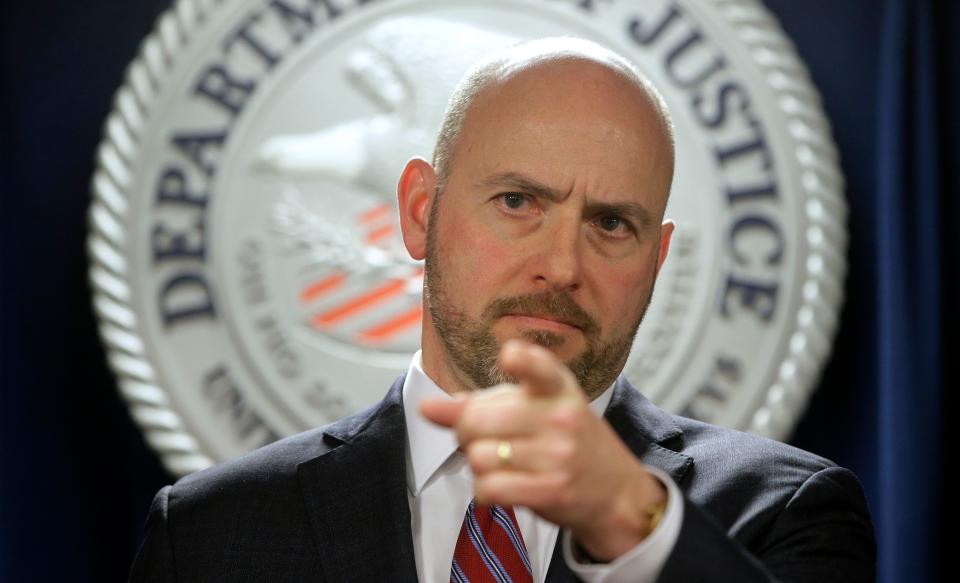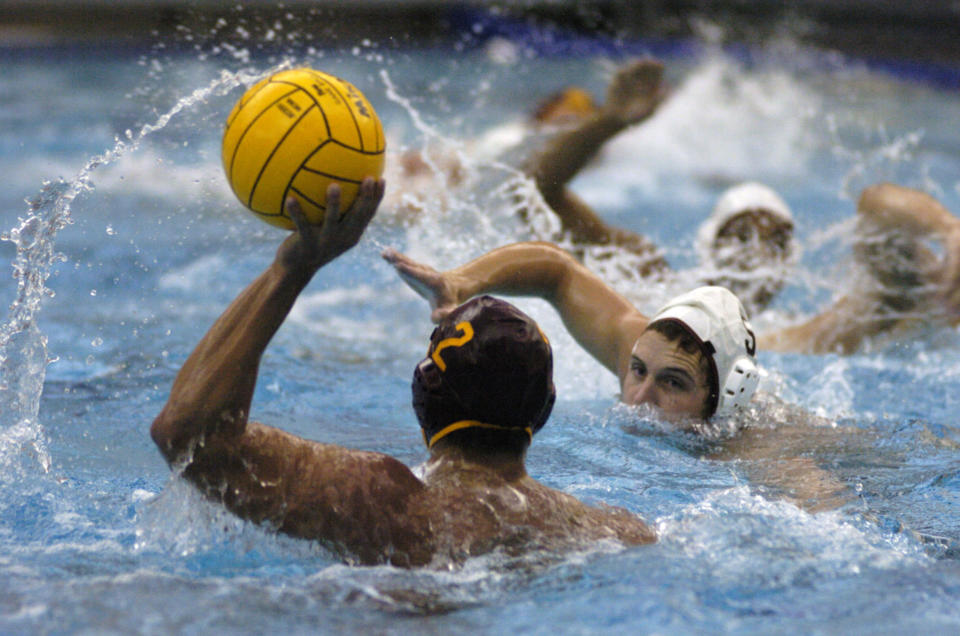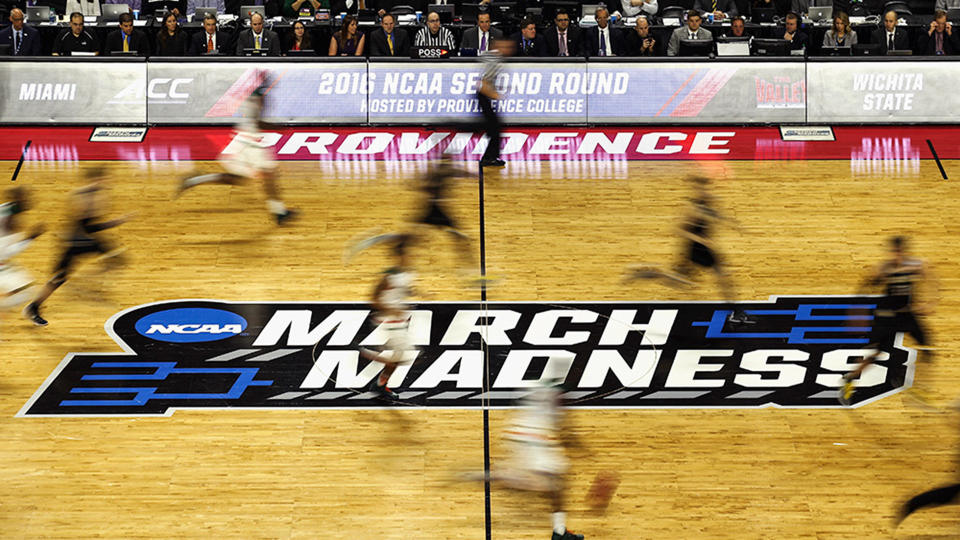Celebrity Admissions Scandal Exposes The Racism At The Heart Of College Sports
“There will not be a separate admissions system for the wealthy,” U.S. Attorney Andrew Lelling vowed Tuesday as he announced his office’s indictment of dozens of people accused of paying huge bribes to help their children gain admission to elite colleges and universities.
The latest college admissions scandal is especially juicy because it involves the corruption-ridden world of college sports. Some of the parents allegedly faked their kids’ participation in sports like soccer, tennis and water polo, and coaches at big-name schools like the University of Southern California, UCLA, Wake Forest, Stanford, the University of Texas at Austin, and Georgetown were among those indicted. But this wasn’t exclusively a sports scandal.
“I wouldn’t single out athletics as being ripe for exploitation here,” said Natasha Warikoo, an associate education professor at Harvard. “What’s ripe for exploitation is the overall system.”
Rich people are going to do rich people things.
And in the cut-throat world of college admissions, one of the most common things rich people do is use athletics to gain access to elite academic institutions for which they might not otherwise qualify.
College sports have long provided a “separate admissions system,” to quote Lelling, that largely benefits the wealthy. Collegiate athletics have helped ensure that the higher education system is rigged in favor of wealthy, white people. Those rich, white, indicted folks who faked their kids’ athletic careers were exploiting a system that privileges even the rich, white folks who don’t cheat.
“The system is broken, and today is nothing but another example of the troubling dysfunctionality of college sports,” Don Jackson, a sports attorney and owner of The Sports Group legal practice, said Tuesday. “Especially because of the fact that none of these kids were really athletes.”

‘Purported Athletic Recruits’
It’s no secret that universities privilege athletes when it comes to the admissions process, and the nation’s most elite institutions are no exception. For years, a large donation to the athletic program or the right academic department has been an easy way for ultra-wealthy parents to get their aspiring young athletes into a school and onto a team.
This is, in essence, legal bribery. It was only a matter of time before a crafty huckster would figure out how to take it even further ― into illegal territory ― to benefit other rich people whose kids weren’t as good at sports or had no interest in filling the role of human victory cigar.
That is precisely what the U.S. Department of Justice says happened.
William “Rick” Singer, the founder of a for-profit college preparatory company, was the mastermind behind the scheme, according to the federal complaint. He positioned himself as a middleman who could take a cut of the money that had otherwise gone directly to the schools by convincing parents to go along with a scheme that benefited him, the coaches who helped, and the parents and students, too. (Singer pleaded guilty to multiple charges in federal court on Tuesday afternoon.)
As Singer knew, schools like USC and UCLA “give consideration” to prospective students’ athletic abilities and may admit sports-focused applicants “whose grades and standardized test scores are below those” of other applicants, the complaint notes. Other schools, like Georgetown and Wake Forest, hold more than 100 admissions slots open annually for their coaches’ picks.
The complaint alleges that the conspirators, in some cases, exploited that system by paying bribes to college coaches to designate students “as purported athletic recruits ― regardless of their athletic abilities and in some cases even though they did not play the sport they were purportedly recruited to play.”
At Georgetown, Yale and UCLA, coaches took bribes ranging from $100,000 to $950,000 to help students gain admittance as athletes even though they hadn’t played the sports in question. At USC, one student gained admission “as a purported rowing recruit, even though she was not competitive in rowing, but instead was an avid equestrian.” Georgetown tennis coach Gordon Ernst and UCLA men’s soccer coach Jorge Salcedo are both facing racketeering charges.
USC water polo coach Jovan Vavic, meanwhile, accepted a bribe “to designate” a student “as a purported recruit to the USC men’s water polo team, thereby facilitating his admission to USC.” Parents sent fabricated awards and statistics to Vavic, who is now facing racketeering charges and has been fired. Vavic then argued to USC’s admissions officials that the student would be “the fastest player on our team.” That student withdrew from the water polo team after just one semester, according to the complaint. In another instance, a parent “sought reassurance that his daughter would not actually have to join the USC water polo team.”
Parents went so far as to photoshop a supposed water polo recruit into an image of someone else playing the sport. The absurdity was evident to everyone involved.
“Last year I had a boy who did the water polo, and when the dad sent me the picture, he was way too high out of the water,” Singer told one parent, according to the complaint. “That nobody would believe that anybody could get that high.”
But the fraud worked nearly every time.
“Is there any risk of this blowing up in my face?” asked Agustin Huneeus, a parent who is facing conspiracy charges after allegedly helping his daughter gain admission to USC as a fake water polo recruit, according to the complaint.
“Hasn’t in 24 years,” Singer replied.

‘Affirmative Action For Affluent White Kids’
Of course it hadn’t.
Throughout college sports, and at the most elite institutions in particular, the primary beneficiaries of the privilege of playing on a team have been white students.
“College sports at elite schools are a quiet sort of affirmative action for affluent white kids,” The Atlantic’s Saahil Desai argued last year, adding that they “play a big role in keeping these institutions so stubbornly white and affluent.”
At many top-tier colleges, the admissions structure overwhelmingly benefits athletes. At Harvard, The Atlantic noted, non-athletes are admitted at rates “nearly 1,000 times lower” than athletes with comparable scores on the school’s admissions scale. Twenty percent of students admitted to Ivy League colleges each year are athletes, according to Columbia University professor Jonathan Cole.
This isn’t an accident. As Desai noted, schools value the economic and prestige benefits that come with successful sports programs. That gives coaches leverage to obtain students they want, even if those kids might not otherwise beat out other qualified applicants.
In 2012, a Dartmouth academics adviser told Business Insider that they were “constantly peeved by athletic admissions,” a process under which “coaches submit lists to admissions officers, ranking recruits, saying these are the kids we really want, and as you get to the top of the list you can be more lenient with academic standards.”
Most white student-athletes play sports like baseball and lacrosse, sailing and crew, soccer and tennis. While the Justice Department’s complaint does not mention the race or ethnicity of the more than 40 people charged, most of them were white people pretending that their kids played sports in which the overwhelming majority of Division I participants are white. In 2017-2018, according to the NCAA’s own numbers, 69 percent of Division I women’s soccer players were white. Eighty-two percent of Division I sailors were. For water polo and volleyball, it was 65 percent. (Overall, more than 60 percent of Division I athletes are white. At elite schools like the Ivies, white athletes make up an even larger majority.)
This flies in the face of what we think we know about college sports: The archetypal college athlete in most Americans’ minds is the black male student who makes up the majority of Division I basketball and football teams ― the athletes whose labor draws thousands of fans to arenas and stadiums and fills the coffers of university athletic departments with millions of dollars.
That the majority of black students at top colleges and universities tend to be athletes fosters the biased idea that sports serve as another form of affirmative action for black people ― that were it not for sports, most of the black students on college campuses wouldn’t be there at all.
You can hear this in the paternalistic tone the NCAA’s higher-ups use to remind us how many poor black kids they’ve helped. And you can see the ways that perception of the black athlete as a faux student is reinforced by the sports scandals that do grab our attention: the University of North Carolina’s Afro-American Studies academic fraud scandal that hit the school’s prominent football and men’s basketball programs, former University of Memphis star Derrick Rose’s questionable ACT and SAT scores, or the overly easy tests and fake grades handed to two University of Georgia basketball players in the early 2000s, to name but three.
But Tuesday’s news ought to shift our perceptions of who’s really benefiting from college athletics, or from the sort of bribery that some rich white folks turn to even when their kids aren’t athletes.
Love HuffPost? Become a founding member of HuffPost Plus today.

What stood out to Jackson, the sports lawyer, was that each alleged athlete in the latest scandal appeared to get away with cheating so easily.
The NCAA requires anyone who wants to play college sports to register with its Eligibility Center, a clearinghouse that certifies academic eligibility and checks athletes for potential violations ― including suspicious test scores. (This part of the system applies to scholarship and non-scholarship athletes at the Division I and II levels.)
“If a kid makes a 12 on his first [ACT] attempt, and then a 12 on his second, and then a 29 on his third, you should probably red-flag that kid and take a long, hard look at his test scores,” said Jackson, who is also a law professor at Alabama’s Samford University. “On the other hand, I’ve represented African-American kids who took the SAT one time and made a satisfactory score, but the NCAA or a conference red-flagged that score, [and then] the testing service investigated it and canceled that score.” (In 2015, Jackson publicly complained about an instance in which a single test score from a black athlete he represented triggered a review by the NCAA Eligibility Center, telling The Sporting News that the center’s processes were “racist as hell.”)
And yet many of the “purported student-athletes” involved in Tuesday’s complaint apparently passed muster with ease, despite their parents allegedly paying a middleman to falsify their scores or help them cheat on entrance exams. It’s hard to imagine that the fact they were white kids pursuing opportunities in overwhelmingly white sports and, in some cases, overwhelmingly white schools wasn’t a factor.
“I feel to some degree of certainty that these kids, their test scores, were likely not questioned by the NCAA,” Jackson said. “Now that says something.”
The corrupt relationship between so many colleges and their sports programs perpetuates this unequal and racially biased system in one more way.
Especially at larger universities, the money made off football and basketball helps to fund all the other sports. Or as Jackson put it, “The revenue generators are African-American student-athletes, and the people who are benefiting are not.”
A federal government that wanted to ensure that college sports weren’t entirely rigged in favor of the wealthy could take action to fix that, particularly in its other major case involving college athletics. In 2017, the Justice Department obtained indictments against multiple college basketball coaches and shoe company executives as part of an ongoing probe into corruption and bribery within college basketball. The schemes involved alleged undercover payments to basketball players and their families ― a black market result of the NCAA’s refusal to pay players in top sports what they’re worth. But in that ongoing probe, the Justice Department took the side of the privileged and decided to effectively enforce the NCAA’s most pernicious rules.
Most of the basketball players who would benefit if the feds forced the NCAA to fairly compensate athletes for their labor are black.
This article originally appeared on HuffPost.

